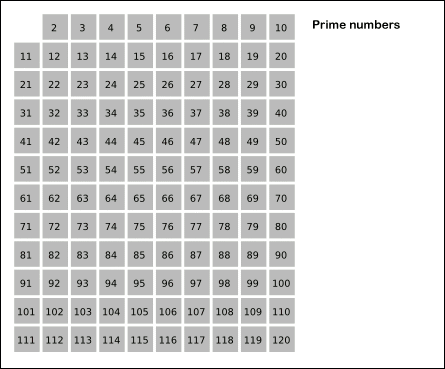I am not fantastic at math. I've always found it interesting, but it's never come to me naturally. Sometimes it's good to face things you're not good at and give them a shot! So here we are, goofing off with prime numbers.
So first off, what is a prime number anyway?
Using a grade school explanation of it, prime numbers are natural numbers that can be evenly divided by two divisors - the number itself and 1.
A few things:
- By natural number, I mean whole number (no decimals or complex numbers or crazy things) > 0.
-
By divisors, I mean a denominator. So in
10 / 2 = 5, it would be 2. -
Those factors are the number itself (
nlets say) and the number 1.
Okay, cool. So some number, itself, and 1. Got it.
What are some prime numbers?
A small sample would be
{2, 3, 5, 7}
.
How did you figure that out?
Let's first try out a real quick test for prime numbers between 1 and 10:
- ✘ Trick question. One isn't considered a prime number.
- ✔ That's our only option here!
-
✔ We can skip
3 / 3and3 / 2 = 1.5doesn't work. So count 3! -
✘
4 / 2 = 2so we can't count 4. -
✔
5 / 4|5 / 3|5 / 2don't give us whole numbers. So count 5! -
✘
6 / 5|6 / 4won't work.6 / 3 = 2so we can't count 6. -
✔
7 / 6|7 / 5|7 / 4|7 / 3|7 / 2don't give us whole numbers. So count 7! -
✘
8 / 4 = 2so we can't count 8. -
✘
9 / 3 = 3so we can't count 9. -
✘
10 / 5 = 2so we can't count 10.
Putting it together, you get the set
{2, 3, 5, 7}
.
You might notice a few things too:
- All of the even numbers are omitted (save for 2). So right away you knocked out 4, 6, 8, and 10.
- All of the numbers that are multiples of 3 were removed (save for 3). So you could eliminate 6 and 9.
-
Even if we somehow missed that 10 / 2 = 5, we would catch that 10 / 5 = 2.
- In other words, multiples of 5 disappear.
You're finding all numbers that are multiples of something else . Once you've eliminated those numbers, you're left with the prime numbers! And that is the essence of the Sieve of Eratosthenes.
Here's a handy illistration from Wikipedia :

So how do I find the prime numbers under 123,456?!
Running this by hand (or most algorithms really) can be tedious. Good thing we've got these shiny fancy computer boxes now. They're even internet-enabled now!
An implementation of this I put together in F# can be found here . The way I put together my implementation was probably not the most efficient, but I think is somewhat straight forward (here's a paired down form to show the idea):
let rec runTest multipliers limit removals =
let multipler = List.head multipliers
if multipler > int (sqrt (float limit))
then
removals
else
let updatedRemovals = generateStep multipler limit removals
runTest (List.tail multipliers) limit updatedRemovals
let n = 123456
let startSeq = seq { for i in 2 .. n -> i }
runTest (List.ofSeq startSeq) n Set.empty
|> Set.diffeernce (Set.ofSeq startSeq)
A quick breakdown of the code above :
-
First, check if we need to calculate more primes by looking at the next multiplier.
-
If we do need to check, we generate the values from
multiplier^2to the upper bound specified. -
We that set of values with the previously calculated value to omit (see
Set.union). - Repeat from #1.
-
If we do need to check, we generate the values from
-
Once here, all the composite numbers have been found.
-
These are removed from the range from 2 to the upper bound (see
Set.difference).
-
These are removed from the range from 2 to the upper bound (see
- You are now left with only prime numbers!
So there you have it - A way to find prime numbers. In Part 2, we'll goof around more by talking about how prime numbers actually can make any other natural number.